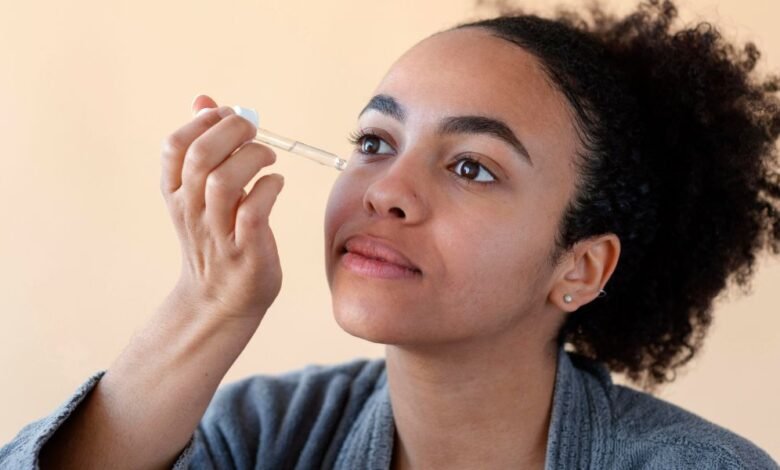
A typical objective of skincare regimens is to achieve radiant, glowing skin, and serums are an essential tool in this endeavor.
The best serum for glowing skin will depend on your skin type and concerns, but serums generally offer several advantages, ranging from brightening and moisturizing to lessening aging symptoms.
These potent solutions can be a game-changer in your skincare routine. Determining how frequently a serum should be applied to achieve the optimum effects is difficult.
This post will discuss how often to use a serum for radiant skin, taking into account your skin type, the ingredients in the serum, and your entire skincare regimen.
Comprehending Serums
Understanding serums and their functions is crucial before discussing how often to use them. Serums are lightweight and highly concentrated skincare solutions made to target particular issues with the skin.
They are highly concentrated in active components, including antioxidants, peptides, and vitamins.
Serums help provide focused effects since their active ingredients can permeate the skin more deeply than those found in other skincare products.
There are many different types of serums, such as anti-aging, brightening, and moisturizing ones. Every variety addresses distinct skin conditions and necessitates distinct application techniques.
Depending on the demands of your skin, you might use a moisturizing serum more often than a brightening one.
Factors Affecting the Frequency of Serum Use
Skin Type
greasy skin
It could benefit people with oily skin to use serums less regularly. Excessive use might make oiliness worse and cause pimples.
Depending on how your skin reacts, you can apply a lightweight, non-comedogenic serum daily or a few times a week.
Finding the best serum for glowing skin is crucial, but remember that individual skin types vary, so experimentation is critical.
Dry Skin
To keep the moisture balance in their skin, people with dry skin need to apply moisturizing serums more regularly. Applying it every morning and night helps keep the skin nourished and radiant.
Mixed Skin Type
Serum usage frequency for combination skin can change based on the unique requirements of various skin areas.
It might be best to take a balanced approach, apply serums in the morning and evening, or concentrate on specific regions.
Ingredients in Serum
Hydrating Creams
They are usually applied every day to help keep the skin hydrated. Glycerin and hyaluronic acid are examples of ingredients that offer both short-term and long-term advantages.
Brightening Lotions
These frequently include components like niacinamide or vitamin C. They can be used daily, but you should monitor how your skin responds because some brightening agents might make it sensitive.
Lower the frequency of use to a few times per week if you become irritated. The best serum for glowing skin will depend on your skin type and specific concerns, but these ingredients are a great starting point.
Anti-Aging Creams
Anti-aging serums frequently contain retinol and peptides, among other ingredients.
Typically, they are used once a day, ideally in the evening, as they may increase your skin’s sensitivity to sunlight. Specific formulas, mainly those strong, might be used every other day.
Entire Skincare Regimen
How often you apply a serum depends on your entire skincare regimen. It’s critical to balance applying numerous active chemicals, such as acids or retinoids, to prevent overdoing your skin.
If you use a powerful exfoliating product, use a gentler serum on alternate or alternating days to avoid irritation.
Skin Issues and Objectives
Specific skin conditions and goals may also influence how often a serum is applied. For instance, if your goal is to reduce hyperpigmentation, regular daily usage of a lightening serum is required for optimal results.
Conversely, if your goal is to keep your skin healthy overall, apply a serum several times a week. The best serum for glowing skin will depend on your needs and concerns.
How to Use Serums in Your Daily Routine
Morning Schedule
Apply a serum first thing in the morning, then moisturize and apply sunscreen after cleansing. Morning serums frequently emphasize hydration and defense against outside stimuli.
Using a brightening serum can help maintain your skin’s brightness all day. To shield your skin from UV ray damage, apply a broad-spectrum sunscreen afterward.
Evening Schedule
Serums that focus on regeneration and repair are commonly used in the evening. Serums that are anti-aging and moisturizing work exceptionally well at night when your skin is naturally repairing itself.
The best serum for glowing skin will depend on your skin type and concerns, but generally, those with regenerative and reparative properties are ideal for nighttime use.
After cleansing but before using a night cream, apply your serum. This makes it possible for the active components to permeate the skin and function better as you sleep.
Modifications in Frequency
If you add a new serum to your routine, start with a lesser frequency and gradually increase usage until your skin adjusts.
For instance, use a new serum every other day for the first week and then every day if there are no signs of irritation.
Observing the Reaction of Your Skin
It’s essential to monitor your skin’s reaction to serum application. Look for any indications of redness, inflammation, or extreme dryness. If you have any negative responses, reduce the frequency of application.
For example, reduce the frequency or move to a softer serum if your skin becomes irritated or flaky.
The Best Methods for Applying Serum
- Patch testing: First, make sure you’re not allergic to any of the chemicals in a new serum by doing a patch test. Apply a tiny amount to a specific location and observe any adverse reactions for a full day.
- Application Technique: Massage serum onto dry, clean skin. Stroke gently upward to improve absorption. Don’t apply too much; a few drops should be enough.
- Maintaining consistency is essential to seeing outcomes. Using serums as prescribed regularly aids in producing the intended glowing look. Missing applications may cause a delay or lessen the advantages.
- Avoid Mixing: Take care when mixing several serums with various active components. Excessive use of strong chemicals might cause skin irritation. If you use many serums, consider switching them up or applying them on multiple days.
To read more blog: How to Glow Skin Naturally: A Comprehensive Guide
Final Thoughts
The best serum for glowing skin depends on various factors, including the serum’s contents, skin type, and overall skincare routine. Some serums excel when used a few times weekly, while others can be used daily.
Achieving and maintaining a radiant complexion requires close attention to your skin’s response and adjusting your serum usage accordingly.



